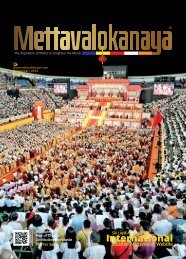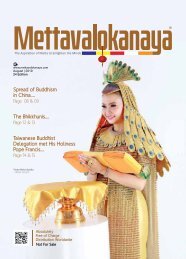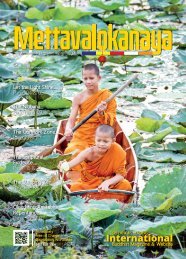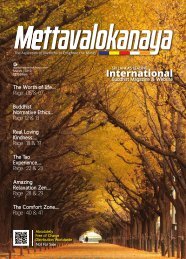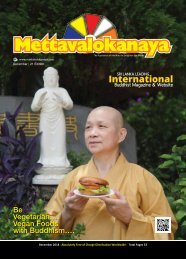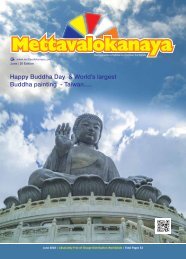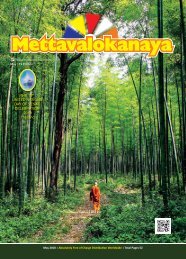mettavalokanaya_international_buddhist_magazine_december_2019
This is the Sri Lankan's Most Popular & Leading Monthly International Buddhist Magazine, “Mettavalokanaya” on December Edition - 27. “Mettavalokanaya” Buddhist Magazine has been successfully distributed to 40 countries worldwide. Specially distributed Overseas High Buddhist Monks, Masters, Nuns, Worldwide Buddhist Monasteries & Associations, International Buddhist conferences, Forums and High Commissions & Embassies situated in Sri Lanka & overseas Sri Lankan High Commissions & Embassies.
This is the Sri Lankan's Most Popular & Leading Monthly International Buddhist Magazine, “Mettavalokanaya” on December Edition - 27. “Mettavalokanaya” Buddhist Magazine has been successfully distributed to 40 countries worldwide. Specially distributed Overseas High Buddhist Monks, Masters, Nuns, Worldwide Buddhist Monasteries & Associations, International Buddhist conferences, Forums and High Commissions & Embassies situated in Sri Lanka & overseas Sri Lankan High Commissions & Embassies.
You also want an ePaper? Increase the reach of your titles
YUMPU automatically turns print PDFs into web optimized ePapers that Google loves.
Sacredness
in Pure
Buddhism….
Buddha claimed that all living
beings have the buddha-nature.
By admitting that we are buddhas
ourselves, we are elevating
ourselves to the same status as that of
the Buddha, holding the same True-
Thusness. Is this not sacred? Is not your
reliance on Buddha’s teaching on the
Three Dharma Seals, Four Noble Truths,
Twelve Links of Dependent Origination,
Six Paramitas, the Bodhi Mind, and the
Bodhisattva path also sacred? When
each of us keeps faith that Humanistic
Buddhism will bring harmony, family
happiness, a positive mind, and
liberation, is this also not sacred?
Since Humanistic Buddhism is
centered on human beings, the true
Buddhist teachings shall carry the aim
of finding ultimate happiness by relying
on oneself, and the Dharma. Is this not
sacred? By reaching out to society and
serving the people, are not the great
ideals and aspirations of ‘propagating
the Dharma to benefit living beings’ and
‘to reach for Buddhahood and at the
same deliver living beings’ sacred?.
The sounds of the creeks are voices
spoken by the Buddha’s broad and long
tongue; the mountains are none but
manifestations of Buddha’s pure body.’
The Buddha’s Dharma-body has become
one with the universe. So where is he
not found?” The Buddha is found within
faith. When you have faith and practice
his teachings accordingly, then he will be
found in your heart, and in everything
that you do.
Faith in Humanistic Buddhism shall
lead to the purification of body and mind.
With an open mind, you shall transcend
all differences between the self and
others, as well as free yourself from
attachment, delusion, and affliction.
Additionally, you shall feel the joy of
Chan and Dharma. These are all benefits
that can be attained through the practice
of Humanistic Buddhism.
Zhang Taiyan, one of the prominent
Chinese thinkers once said, ‘Those
claiming to be intellectuals cannot
do without the Buddhist philosophy,
because the Buddha’s teachings such
as causes and conditions, and karmic
retribution are universal rules applicable
to all, and therefore important to all.’
Liang Qichao, one of the greatest Chinese
scholars also claimed, ‘The Buddhist
faith is one of wisdom, not superstition.
It emphasizes the greater good over the
lesser good, and advocates this-worldly
mindset over another-worldly one.’
In addition, Sun Yat-sen also said,
Founder of the Fo Guang
Shan Buddhist Order
and Buddha’s Light
International Association
(BLIA) in Taiwan
Most Venerable Master
Hsing Yun
Taiwan
‘Buddhism is world-saving grace, the
mother of philosophy; the study of
Buddhism amends the biases of science.
The Dharma serves as a supplement to
the Law, the latter stops crime, while
the former prevents them.’ His mother
being a devout Buddhist, Mao Zedong
mentioned the need to promote
the outstanding Buddhist traditions
and regard religion as culture, not
superstition.
Albert Einstein once said,
‘Buddhism has the characteristics
expected in a cosmic religion of the
future: it transcends a personal God,
avoids dogmas and theology; it covers
both the natural & spiritual, and is based
on a religious sense aspiring from the
experience of all things in meaningful
unity. Buddhism fits this description.
If there is any religion that would cope
with modern scientific needs, it would
be Buddhism.’
Therefore, what is needed today is
a consensus on Humanistic Buddhism,
that it shall benefit humanity and
resolve human concerns. Once these
problems are resolved, what further
problems could possibly arise? After
reading this book, you shall gain an
overall understanding of Buddhism.
Furthermore, by practicing accordingly
we shall progress from being a human
being to becoming a buddha. Our faith
in Humanistic Buddhism shall lead us
towards the perfection of life.
For over two thousand years,
traditional Buddhism has been tainted
by beliefs that, under the disguise of
Buddhism, preached superstition such as
divination by time, fengshui, geography,
picking sticks, and fortune telling.
Buddhism had almost been turned into a
superstitious belief that worships deities
and spirits.
As the saying goes, “Out of
prevailing rules arises faults.” These
misunderstandings have arisen due to
the fact that the long periods Buddhist
dissemination have enabled the
infiltration of teachings and practices
into Buddhism that have gone against the
Buddha’s original intents. As a result, the
Buddha’s humanistic character became
lost, and the overall image of Buddhism
distorted, which is a true pity. Without
Humanistic Buddhism, how could the
true identities of heretics who feed off
the advantages of Buddhism have been
exposed?
Today, we abide by the humanistic
teachings of Buddhist masters such as
“Dharma can only be found in the world,
and enlightenment cannot be attained
away from it” by Huineng the Sixth
Patriarch, or “Who we shall look up to
is none other than but the Buddha, and
the goal that we shall pursue is none
other than but the perfection of our
character” by Master Taixu, for these are
all teachings to urge Buddhists to unite
as one and reinstate Buddha’s original
intents.
As we look at Zhao Puchu and
Venerable Xuecheng, one former and
the other the current President of the
Buddhist Association of China, are their
endeavors not also the propagation
of Humanistic Buddhism? A clear
evidence is that Venerable Xuecheng
has included “the establishment of
Buddhist undertakings with the mission
of propagating the Humanistic Buddhist
philosophy” in the Association’s
Constitution.
One of the most arduous tasks
required of traditional Buddhism is to
clarify false understandings and reinstate
the true goal of Buddhism by tracing
it back to the Buddha’s humanistic
character. Is this at all feasible? If it is, a
common realization of what Buddha had
originally intended to teach will arise
among all Buddhists, and consequently,
all shall realize the importance of
advocating Humanistic Buddhism.
(Special Thanking to Most Venerable
Miao Guang and Man Chien)
Goh Bee Wah
From Kaohsiung, Taiwan.
“Purification
of body and
mind”….
8 l Mettavalokanaya l December l 2019 l www.mettavalokanaya.com www.mettavalokanaya.com l 2019 l December l Mettavalokanaya l 9










